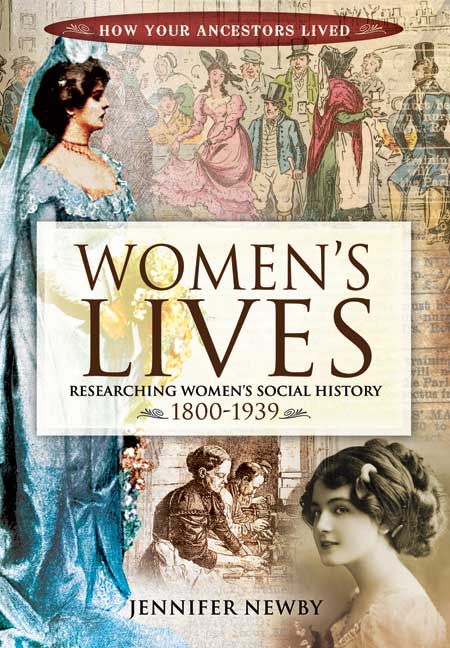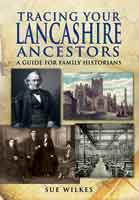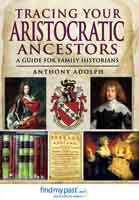Women's Lives (ePub)
Researching Women's Social History 1800 - 1939
Imprint: Pen & Sword Family History
File Size: 2.7 MB (.epub)
Pages: 224
Illustrations: 40
ISBN: 9781844686544
Published: 24th October 2011
Women's lives have traditionally gone unrecorded in history. But housewives, factory girls and servants all had their own distinctive voices, and, if you know where to look, there are plenty of sources to explore.
Jennifer Newby's guide to women's social history between 1800 and 1939 includes essential starting points for research. A useful handbook for family historians, as well as an engaging read for social history lovers, each chapter focuses on a different group, with suggestions for further reading and a helpful timeline.
Compare the lives of factory workers, middle-class women, domestic servants, criminals, aristocrats and agricultural labourers. Hear the voices of obscure women alongside those of celebrities – from rebellious servant Hannah Cullwick to daring aristocrat, Lady Colin Campbell, prostitute Ellen Reece, and bored middle-class daughter, Katherine Chorley.
If you want to trace female ancestors or simply discover more about how women lived in the past, then this book is ideal to help you get started with your own research.
This book gives detailed account of the lives of women in agricultural work, in service and in factories, with additional chapters on middle class women, aristocratic women and criminal women. Many interesting examples of each category are given as well as the sources for researching individual women’s lives. Details of the daily working life of many of these women can only make us thankful that legislation was brought in the improve things.
Genealogist’s Magazine
Women’s Lives Researching Women’s Social History is one of a series designed to enable those researching family history to go beyond the public records and the census, which often throw tantalisingly little light on women’s lives; it gives researchers some told to put flesh on the bones of women in their families so they are not defined solely as daughters, wives and mothers. One of its great strengths is the way it foregrounds the experiences of working class women and reminds us that most of them complained that ‘wives should be in their proper sphere at home, instead of being dragged into competition for livelihood’.
Sarah Rennie, Journal of the North East Labour History Society
It should be a starting point for extending our knowledge of the wide range of occupations in which women from the north east worked.
Encourages family historians to go further and think about the life experience of their ancestors. Women at work are described, with the lives of middle-class, aristocratic and criminal women, and sources that can be accessed about these.
Local Historian magazine
Jennifer Newby tackles this subject in a readable way, bringing it alive in every aspect.: domestic service, on the land, in the factories, middle class women, aristocratic women, and criminal women. In each of these categories she poses the questions, Who? Why? What? And How? By doing so she focuses our minds on the particular roles and stations in life they fulfilled and how they influenced life of their time.
Ryedale Gazette And Herald, May 2012
It is a fascinating story within our social history which the author deals with in a way that keeps our interest glowing She goes further for those who want more by leading them to the various sources available. It becomes a book now only of interest to the general reader, but to the student, the academic, the writer, the teacher etc.
As a writer it will certainly remain handy on my bookshelves.
The author presents an insight into women’s lives in Britain in a variety of careers and situation. The six main chapters deal with women in domestic service, those working on the land, those working in factories, criminals, the middle classes and aristocrats. There is a guide to resources and key sources for researching in each of these different backgrounds as well as a general biography.
Bristol & Avon Family History Society, March 2012
Jennifer Newby’s guide to women’s social history between 1800 and 1939 includes essential starting points for research. A useful handbook for family historians, as well as an engaging read for social history lovers, each chapter focuses on a different group, with suggestions for further reading and a helpful timeline.
Kent Family History Society Journal, March 2012
If you want to trace family ancestors or simply discover more about how women lived in the past, then this book is ideal to help you get started with your own research.
This handy guide reminds us of places where women are to be found, if only we look.
Who Do You Think You Are Magazine
In the past, women were less likely to literate than men, their career options were far more limited and they were rarely financially independent – so it’s no wonder that the history books are full of men. This fascinating read seeks to redress the balance by telling the stories of those women, from all walks of life, who were our mothers and our grandmothers.
Womens Weekly, Jan 2012
This gives an interesting window into women’s lives and careers from 1800 to 1939. Newby provides an engaging read for social history lovers, and a useful handbook for family historians.
Scotland Magazine, Jan 2012
The book is laid out clearly and is presented and structured with the researcher in mind. Someone looking for information on a particular topic can quickly turn to the relevant section. This is an excellent reference tool. I would not hesitate to recommend this book for any student or researcher of women’s social history.
Federation of Family History Societies
An author from Knaresborough has written a book looking at women’s lives through history. Jennifer Newby who was brought up in the town, focused on social history between 1800 and 1930 after finding the voices of housewives, factory girls and servants had gone unrecorded.
Harrogate Advertiser, 9th Dec
Among her subjects are rebellious servant Hannah Cullwick, daring aristocrat Lady Colin Campbell and prostitute Ellen Reece. The book explored the day-to-day lives of everyone from domestic servants, factory workers and criminals to middle class women and aristocrats.
Drawing on delightful original sources, Jennifer brings 19th and early 20th century women to life and helps you put those in your female line into context, whether they were factory workers, Land Girls, aristocrats or even criminals!
Family History Monthly, Hollie Bond, Dec 2011
From heart-warming tales of poor women overcoming adversity, like Amy Gregory, sentenced to death in the 1890’s, to bored aristocrats like Molly Bell, this book will change your perceptions of women and highlights just how much they contributed to society. With the voices of many different women filling its pages, this guide is an enjoyable read, as well as a useful resource for genealogists.
Answer the following question for a chance to win a copy of Women's Lives by Jennifer Newby, editor of Family History Monthly magazine. Published by Pen and Sword, this is a brilliant research guide for anyone tracing women's social history between 1800 and 1939.
Find My Past, Online Newsletter Competition, 01/12/11
About Jennifer Newby
Jennifer Newby is the editor of Family History Monthly magazine, and previously worked on Ancestors magazine, at The National Archives. You can read other women's history pieces by Jennifer on her website: www.writingwomenshistory.co.uk














